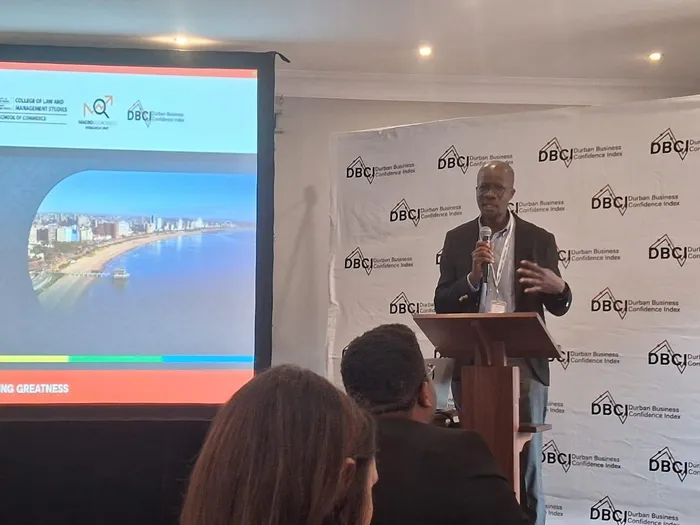Durban business confidence dips for fourth straight quarter amid service delivery issues
ECONOMY

Professor Harold Ngwala professor of economics and the founding member of the Macroeconomics Research Unit (MRU) at UKZN presents Durban Business Confidence Index Q3 2025.
Image: Yogashen Pillay
Durban’s business sentiment weakened again in the third quarter of 2025, marking the fourth consecutive quarterly decline, according to the latest Durban Business Confidence Index (DBCI) released on Monday.
The index, compiled by the University of KwaZulu-Natal’s (UKZN) Macroeconomics Research Unit in collaboration with the Durban Chamber of Commerce and Industry (DCCI) and eThekwini Municipality, fell by 0.53% — from 52.40 points in Q2 to 52.12 points in Q3 2025.
Researchers, Professor Harold Ngwala and Dr Ntokozo Nzimande, said the decline reflected a deterioration in sentiment regarding both current and future economic conditions in the city.
“The data further indicates that business executives were more pessimistic in the third quarter of 2025 than they were in the same quarter of 2024, with the index dropping by 17.38% on a year-on-year basis.”
Despite the decline, the DBCI remains slightly above the neutral 50-point mark and continues to perform better than the national Business Confidence Index, compiled by the University of Stellenbosch, which fell to 39 points in Q3 from 40 points in the previous quarter.
“It appears that the drop in the DBCI is largely driven by national economic conditions rather than Durban-specific factors.”
However, performance varied across sectors. The manufacturing, electricity, gas and water supply, and wholesale and retail trade industries showed modest gains in business confidence compared to the previous quarter.
By contrast, the construction sector continued to weigh on overall sentiment, with its confidence level slumping to 37.8 points in Q3 — more than 12 points below the neutral threshold — as the decline in residential and non-residential building activity persisted.
Ngwala and Nzimande said the findings underscored the need for coordinated efforts between business, municipal, and national stakeholders to stabilise confidence and foster sustainable growth in Durban’s economy.

Durban Business Confidence Index Q3 2025 released on Monday indicated that the index declined for a fourth consecutive quarter in 2025 Q3.
Image: Yogashen Pillay
In the transport, storage, and communication sector, business confidence fell sharply by 13.66%, from 62.13 points in Q2 to 53.64 points in Q3. The decline was attributed to reduced land and freight transport activity, fewer passenger trips, and a drop in auxiliary transport services, according to the South African Reserve Bank (Sarb).
The DBCI also revealed growing dissatisfaction among businesses with service delivery in Durban. Respondents ranked roads (27.1%) as the worst-performing service, followed by environmental management — including sewerage, solid waste, and parks (24.3%) — water (18.6%), public safety (18.6%), and electricity (11.4%).
The report further noted that South Africa’s economic growth had slowed, with real GDP growth easing from 0.8% in Q1 2025 to 0.6% in Q3.
Shunnon Tulsiram, head of economic development and investment promotion at eThekwini Municipality, said the findings underline the importance of strengthening basic infrastructure.
“I think the issue of service delivery providers is very interesting. It's important to note that in terms of our municipality and any municipality out there, there are some basic things that need to work. In fact, they work: water and electricity," she said.
"We'll be getting the necessary grant funding to address infrastructure challenges There are certain things that can only be dealt with through infrastructure. We have consistent growth leaks because the infrastructure underground is not good enough.”
Miike Raftery, chief financial officer at DCCI, said the results accurately reflected the mood of Durban’s business community.
“As organised business, we believe its findings provide a true reflection of the mood of the business community in Durban. We note that the Business Confidence Index remains positive and above the 50-point mark," Raftery said.
"However, the continued decline of the business confidence index for four successive quarters is a cause for concern. More needs to be done to see real change in our economy.”
BUSINESS REPORT